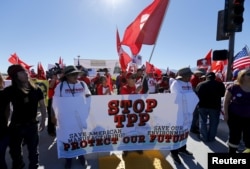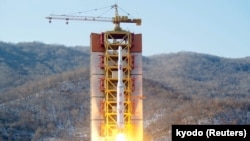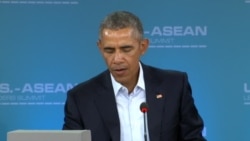President Barack Obama says the United States and the ten members of the Association of Southeast Asian Nations (ASEAN) can together “advance a regional order where all nations play by the same rules.”
Speaking Monday at the opening of the first U.S.-hosted ASEAN summit in Rancho Mirage, California, Obama said ASEAN is “central” to peace and prosperity in the southeast Asian region.
Goal: a set of international rules
During the two-day summit at the historic and scenic Sunnylands retreat, leaders are expected to work on crafting a set of principles “where international rules and norms, including freedom of navigation, are upheld and where disputes are resolved through peaceful, legal means,” said Obama.
The White House views America’s leadership role and engagement in the region as critical to the United States' future prosperity and a vital counterbalance to China’s influence there.
The ASEAN nations include Indonesia, Malaysia, the Philippines, Singapore, Thailand, Brunei, Vietnam, Laos, Myanmar and Cambodia. The dynamic and diverse region is experiencing robust growth and rising tensions, potentially affecting the global economy and security.
Wide-ranging agenda
The leaders will discuss trade and commerce, innovation and entrepreneurship, the implementation of the Trans-Pacific Partnership, violent extremism and the creation of a common set of principles to guide nations on a range of issues, including maritime disputes in the South China Sea.
Speaking to reporters in Rancho Mirage, U.S. National Security Advisory Susan Rice said Southeast Asia is “increasingly the world’s political and economic center of gravity” and “a natural partner of the United States.
Territorial disputes in the South China Sea and China’s increasing activities in its contested waters will be a key topic during the summit.
Obama will speak frankly about U.S. opposition to China’s “militarization” of disputed areas and any escalation of tensions across the region, White House officials said.
It is a sensitive issue for ASEAN countries who want to see a productive relationship between Washington and Beijing and are uneasy about tensions between the two superpowers.
Though the U.S. is not a claimant in the South China Sea disputes, Obama is expected to make clear the U.S. will continue recent freedom of navigation operations in a region that includes the world’s busiest waterways.
“We fully support freedom of navigation and we will stand by our partners,” Rice said.
Beijing says it has long had a rightful claim to the disputed territories.
Watch: The South China Sea Dispute
North Korea
The U.S. and ASEAN leaders will also discuss North Korea’s recent rocket testing and what role China can play in pressuring Pyongyang to end its “provocative” actions.
While the China and the U.S. have disagreed on North Korea, the U.S. sees a common interest with China in ensuring the denuclearization of the Korean Peninsula.
But ultimately the ASEAN summit is about building a cohesive region committed to rules and fairness, administration officials said.
Over the last seven years, ASEAN has become “the region’s leading forum for addressing political and security challenges” said Obama, adding “our sustained engagement is delivering concrete results that benefit all of us.”
A young and rich region
The 10 ASEAN members combined comprise the third-largest economy in Asia, and the seventh-largest in the world, with a combined GDP of $2.4 trillion, according to the U.S. More than 65 percent of its 632 million people are younger than the age of 35.
Trade between the U.S. and ASEAN countries has increased by 55 percent in seven years, according to the White House.
Southeast Asia is now America’s fourth largest goods trading partner, said the president, including U.S. exports that sustain more than 500,000 U.S. jobs. And he credited investment by U.S. companies in ASEAN for the region’s growing middle class.
WATCH: U.S. President Obama speaks at ASEAN summit
Human rights still a concern
On the question of human rights, Rice acknowledged some ASEAN nations “have a long way to go” but she “strenuously” disputed claims that the U.S. is “legitimizing” the behavior of governments with poor records.
"We take every opportunity to talk on human rights,” she said.
At the summit opening, Obama told ASEAN leaders “together, we can continue to support the aspirations and dignity of our citizens,” and said the recent election in Myanmar “gives hope for a nation that is inclusive, united, peaceful and democratic.”

















